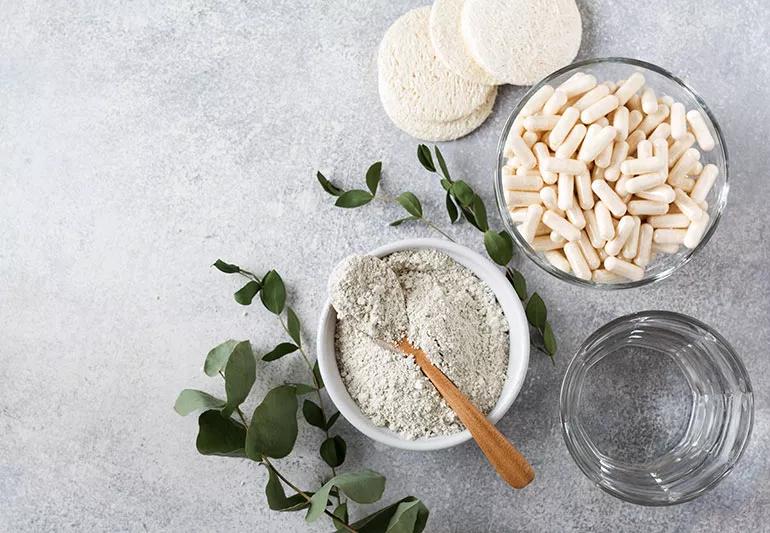Taking them daily may help combat symptoms of aging

Celebrities swear that adding collagen peptides in their daily smoothies keeps them looking young and glam. But what are collagen peptides anyway? And is this seeming fountain of youth accessible to the rest of us?
Advertisement
Cleveland Clinic is a non-profit academic medical center. Advertising on our site helps support our mission. We do not endorse non-Cleveland Clinic products or services. Policy
Registered dietitian Beth Czerwony, RD, LD, explains what collagen peptides are and what they can do for your body.
“Collagen peptides are a supplement that can help your body replace its lost collagen,” Czerwony says. They’re a small, easily digestible form of collagen, a protein that occurs naturally in your body.
But why does collagen matter?
Collagen plays a vital role in the health of your skin, bones and connective tissues, keeping joints strong, making skin elastic and helping protect your organs, as well as other functions. Simply put, collagen holds your body together.
Starting in your 20s, though, your body starts losing collagen. By the age of 40, you’re likely to lose about 1% of your bodily collagen per year, and menopause speeds up that loss, which contributes to wrinkles, stiff joints, worn-down cartilage and decreased muscle mass.
Though we may not all be blessed with the genetics of Jennifer Aniston, we can still reap the potential benefits of collagen peptides, which she swears by. The star has said she puts a scoop in her smoothie each morning to keep her skin youthful and her body limber.
Taking collagen peptides — also known as hydrolyzed collagen or collagen hydrolysate — can help prevent unwelcome health woes by replenishing some of your body’s collagen supply. From skin to gut health, Czerwony explains what collagen supplements can do for your body.
Advertisement
It’s no secret that as we get older, our skin gets duller and more wrinkled. But collagen peptides can help give aging skin an assist. “They help firm the skin and plump it up to keep you looking a little bit younger,” Czerwony says.
Studies show that collagen peptides may actually slow signs of aging by keeping the skin hydrated, which prevents wrinkles.
Are you starting to creak? Your body’s natural collagen keeps your joints stretchy, which means that as your collagen production decreases, the likelihood of developing joint issues like osteoarthritis increases.
“Collagen peptides may help protect your ligaments and tendons,” Czerwony says, “so they’re worth a try for anybody who has arthritic pain or who works out a lot.” In studies, collagen peptides are shown to significantly reduce joint pain among athletes, the elderly and people with degenerative joint disease.
Osteoarthritis, of course, isn’t the only condition that can come with aging. Osteoporosis, which weakens the bones, is also a risk.
Your bones are made primarily of collagen, so when your body’s collagen production decreases, your bones weaken, making them more susceptible to fracture. Studies show that taking collagen peptides may be helpful in treating and preventing osteoporosis.
Collagen also makes up as much as 10% of your muscle tissue, so collagen peptides may be helpful to people with sarcopenia (a loss of muscle mass), too.
Collagen peptides come in both pill and powdered forms and are typically made from bovine (beef) or porcine (pork) sources. Marine collagen supplements — made from fish skin or scales — are also available.
At least for now, there are no vegan collagen supplements, since collagen itself comes from the bones and skin of animals.
Good news: Unless you’re allergic to their ingredients, there are no known side effects of taking collagen peptides. As with anything else, check the label closely, but if you’re allergy-free, you should be A-OK to try collagen peptides.
At worst, Czerwony says, they may not work — but there’s no real risk. “More research is needed on the overall benefits of collagen peptides, but it’s well-documented that they won’t harm you, in proper doses,” she says. “So if you feel like you’re benefitting from them, go for it.”
Studies show that you can safely take 2.5 to 15 grams of collagen peptides per day. Be sure to read the label on your collagen peptides to determine how much you’re getting per scoop, and properly follow dosing instructions to add it to coffee, smoothies and protein shakes. One to two scoops (or tablespoons) is typically standard.
Advertisement
“Take them in whatever way appeals most to start your day off right,” Czerwony says.
Collagen peptides shouldn’t turn gummy or gel-like when they get wet, which means they’ll disappear into your daily drinks without changing the taste or consistency (though flavored versions are available). If you find that yours is clumping — especially in cold liquids — you may want to try another brand.
You might’ve heard that heat has a negative effect on collagen peptides, but they aren’t impacted by heat unless they get really, really hot — 572 degrees Fahrenheit (300 degrees Celsius) or above, to be exact.
So, sure, don’t heat your collagen peptides in a pizza oven. But if you’re just putting them in your hot cup of coffee, there’s no need to worry.
Advertisement

Sign up for our Health Essentials emails for expert guidance on nutrition, fitness, sleep, skin care and more.
Learn more about our editorial process.
Advertisement

Topical treatments — and even some cosmetic procedures — may help reduce the appearance of this crinkled-paper look

Though popular with influencers and celebrities, there’s little research to back up claims that they work

This noninvasive procedure can help aging skin by boosting collagen production

Your blood vessels shrink and your skin forms wrinkles to help you grip objects

Try limiting heat styling and eating a healthy diet instead

Lifestyle changes, neck exercises, injections and surgery can all help improve turkey neck

Using tape to smooth wrinkles may be a temporary fix, but there are still risks

What you can do for laugh lines and facial creases

The tropical fruit is a good source of antioxidants and vitamin C

Most people fall asleep within 10 to 20 minutes, but if your experience is different, adjusting your sleep schedule may help

Exploring your hidden side can lead to better understanding of what makes you tick